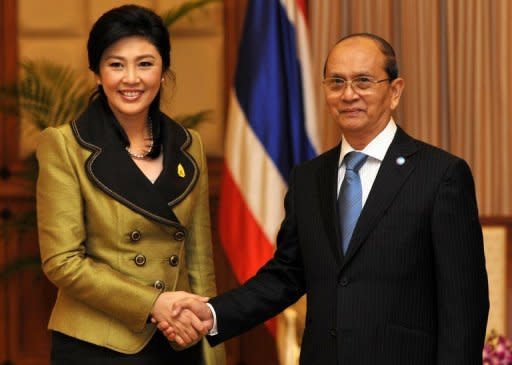Myanmar president visits Thailand
Myanmar's president Sunday made his first official trip to Thailand since taking power in a visit likely to focus on economic ties between his reforming nation and its more affluent neighbour. Thein Sein arrived in Bangkok for a three-day trip that will include talks with Thai Prime Minister Yingluck Shinawatra on Monday expected to cover development and infrastructure investment for impoverished Myanmar. The visit marks "a significant milestone of Thai-Myanmar relations", according to a statement from Thailand's foreign ministry. It is a chance to strengthen ties, "particularly those in support of Myanmar's ongoing economic reform and development efforts for the benefits of both countries and the region as a whole", it said. Thailand has fostered long-standing economic ties with its neighbour and -- along with China and other regional nations -- became a key trading partner with Myanmar during years of isolation under junta rule. But reforms under Thein Sein have triggered a dramatic thawing of relations with the West, which has begun to dismantle strict sanctions against the resource-rich country, amid hopes for a resurgence of its economy. This month the United States gave the green light to US companies to invest in Myanmar including in oil and gas, in its broadest and most controversial easing yet of sanctions, as foreign firms eye potentially lucrative opportunities in the country's energy sector. Thein Sein, who took the presidency of the new quasi-civilian government last year, on Sunday inspected the Laem Chabang deep-sea port in Chonburi, about 80 kilometres (50 miles) from Bangkok, on Thailand's Gulf Coast. Doubts have emerged over a Thai-backed multi-billion-dollar deep-sea-port development in Dawei, on Myanmar's southern Andaman coast, after Thein Sein's government announced it was blocking a coal-fired plant that was to be built at the site. Thein Sein will also meet representatives of Thai industry and agriculture during his trip, including the heads of energy giant Petroleum Authority of Thailand (PTT) and industrial conglomerate Siam Cement. Rajiv Biswas, Asia-Pacific Chief Economist at IHS Global Insight, said Thailand was in a strong position to invest in tourism, healthcare and manufacturing in Myanmar and to assist the country in developing its crippled banking industry. He said other nations would begin to grow their presence in the country but "it will still be China and Thailand that are very much in the lead because they have the connections and are on the ground already". Talks between Thein Sein and Yingluck are expected to include the fate of dozens of Thais arrested across the border and held on charges of land encroachment. Thailand's huge population of Myanmar migrants is also expected to be discussed, with Naypyidaw attempting to improve living conditions for its workers, who are often vulnerable to exploitation. Thein Sein delayed a visit to Bangkok in late May that clashed with opposition leader Aung San Suu Kyi's appearance at the World Economic Forum on East Asia held in Bangkok, in her first overseas excursion for over two decades. Suu Kyi stole the show at the forum, urging "healthy scepticism" over Myanmar's dramatic reforms, saying only the rule of law could cement recent political progress and foster clean investment. The Myanmar leader again postponed the trip in early June.



